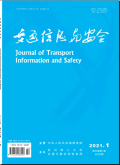交通信息与安全2024,Vol.42Issue(2):1-11,11.DOI:10.3963/j.jssn.1674-4861.2024.02.001
高速公路网联自动驾驶专用车道物理基础设施设计方法研究综述
A Review of Physical Infrastructure Design Methods for Dedicated Lane for Connected and Autonomous Vehicles on Highway
摘要
Abstract
To thoroughly explore the impacts of the physical infrastructure design of dedicated lanes(DL)for Con-nected and autonomous vehicle(CAV)on traffic performances,this paper systematically sorted out the ongoing progress in three domains,namely,DL deployment conditions,DL access types,and separation types between DL and general-purpose lanes.It clarifies the theoretical foundations and practical advancements of existing research,constructing a framework that outlines the relationship between physical infrastructure and traffic system perfor-mance,and such endeavor has shed light on the research gaps and future direction in this regard.The results indicate that current studies on DL deployment conditions primarily focus on traffic efficiency,while assessments of traffic safety are relatively lacking.Divergent conclusions in existing research stem from different assumptions,thus de-manding more precise evaluations of DL deployment conditions in future research.Concerning the access types,both limited access and continuous access have their advantages,yet the embodiment conditions of such advantages require further validation.The design of high occupancy vehicle(HOV)lane access types can also be used for re-evaluation in the scenario of DL.It is essential to ascertain how the separation methods between DL and regular lanes affect the adaptability of human drivers,ensuring their effective adjustment to DL deployment.In general,al-though some progress has been made in current research,the lack of real-world cases and actual deployment effect verification means that simulation-based methods often yield varying conclusions due to differences in assumptions and other factors.Future research should focus on accurately describing CAV behavior,conducting longitudinal and cross-sectional comparison studies,and quantifying the impact of DL design on safety and efficiency to make im-provements.关键词
道路设计/网联自动驾驶专用车道/物理基础设施/交通安全与效率/网联自动驾驶Key words
road design/dedicated lane for connected and autonomous vehicles/physical infrastructure/traffic safe-ty and efficiency/connected and autonomous vehicles分类
交通工程引用本文复制引用
杨昌俊,郑辰浩,戴晶辰,李瑞敏..高速公路网联自动驾驶专用车道物理基础设施设计方法研究综述[J].交通信息与安全,2024,42(2):1-11,11.基金项目
国家重点研发计划项目(2019YFB1600100)资助 (2019YFB1600100)

